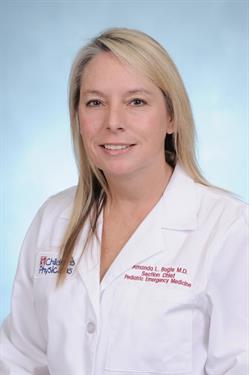The overall goal of the Pediatric Emergency Medicine Subspecialty Training Program is to train physicians to be proficient in the practice of pediatric emergency medicine. It focuses on the emergent and immediate needs of patients with regard to diagnosis, resuscitation, and trauma stabilization. Graduates will be considered experts in the fields of triage, advanced life support, procedural sedation, and primary trauma management. We prepare our fellows to acquire the teaching and research skills necessary to become independent and productive academic pediatric emergency medicine physicians and leaders in this field of medicine.

Amanda Bogie, MD
Pediatric Emergency Medicine Fellowship Program Director
CMRI Express Employment International Endowed Chair, Children's Health Foundation
Regent's Professor, Department of Pediatrics
Pediatric Emergency Medicine Section Chief
Clinical Professor
amanda-bogie@ou.edu | 405-271-2429

Kendall Luyt, MD
Pediatric Emergency Medicine Fellowship Associate Program Director
Clinical Assistant Professor
kendall-luyt@ou.edu | 405-271-2429

Ryan McKee, MD
Pediatric Emergency Medicine Fellowship Associate Program Director
Clinical Associate Professor
ryan-mckee@ou.edu | 405-271-2429
Curriculum
Clinical Experience
Our fellows are trained in the care of critically ill and injured children. Fellows are also given exposure to focused adult practice, allowing for the evaluation, triage, and basic care of our occasional “grown-up” patients. Fellows also get exposure to a wide variety of procedures, including procedural sedation, splinting, laceration repairs, intubations, central line placement, foreign body removal, FAST, etc.
Rotations
| PEDs-Trained |
| Rotation |
Obligations |
| Pediatric ED & Research |
26 months |
| Adult ED/EMS |
3 months |
| PICU |
1 months |
| Adult Trauma |
1 month |
| Anesthesia/Sedation |
1 month |
| Child Abuse/Administration |
1 month |
| Pediatric Radiology/Ultrasound |
2 Weeks |
| Elective (ORL, Cardio, Cath Lab, Orth, Sport Med, etc.) |
1 Month/2 weeks |
| Toxicology |
1 Month |
| EM-Trained |
| Rotation |
Obligations |
| Pediatric ED & Research |
15 months |
| PICU |
1 months |
| Anesthesia/Sedation |
1 month |
| Toxicology |
1 month |
| Child Abuse/Administration |
1 month |
| Elective (ORL, Cardio, Cath Lab, Orth, Sport Med, etc.) |
1 Month/2 weeks |
| Pediatric Radiology/Ultrasound |
2 Weeks |
| Peds Subspecialty Clinic (TBD)* |
2 Months |
| TLS Newborn Nursery/NICU |
1 Month |
Sample Block Schedules
Below is an example of a Peds-trained and ER-trained block schedule.
| 1st Year (Peds Trained) |
2nd Year (Peds Trained) |
3rd Year (Peds Trained) |
| Peds ED/Research x 7 |
Peds ED/Research x 10 |
Peds ED/Research x 9 |
| Adult ED (SW or Tulsa)* |
Adult ED(SW)/EMS x 2 |
Admin/Child Abuse* |
| Peds Anesthesia |
|
Elective* |
| PICU* |
|
Toxicology* |
| Peds Rad/Ultra - Elective |
|
|
| Trauma* |
|
|
| Average Total ED Shifts: 92 |
Average Total ED Shifts: 124 |
Average Total ED Shifts: 120 |
| 1st Year (ER Trained) |
2nd Year (ER Trained) |
| Peds ED x 4 |
Peds ED x 4 |
| Peds ED/Research x 3 |
Peds ED/Research x 4 |
| PICU* |
Admin/Child Abuse |
| Peds Sub Specialty Clinic* |
Peds Sub Specialty Clinic* |
| Peds Anesthesia |
Elective |
| TLS NN/NICU* |
Peds Rad/Ultra - Elective |
| Toxicology |
|
| Average Total ED Shifts: 106 |
Average Total ED Shifts: 124 |
Research Experience
Over the course of the Peds-trained, three-year Fellowship, one year is dedicated to research by the ABP. We have divided this research year throughout the program to occur within the Pediatric ED rotations. Although EM-trained Fellows are not required to complete research by the ABP, they may choose to do so, and it will also be divided throughout their two-year Fellowship within the Pediatric ED Rotations. Our goal is for each fellow to produce and complete a well-designed study that will be published in a peer-reviewed journal.
To ensure a successful research project, our fellows are provided with:
- Research methods workshops & lectures
- IRB application & navigation assistance
- Biostatisticians
- Faculty research mentors
- Dedicated research staff
Valorie Owens, MSW, CRA
Pediatric Emergency Medicine Fellowship Research Project Manager
valorie-owens@ou.edu | 405-271-2429